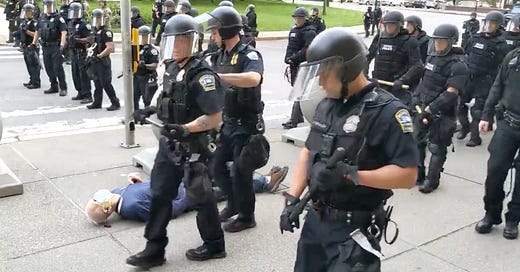Why Not Abolish the Police Unions?
Some interesting new numbers from the Monmouth poll: Only 18 percent of voters think “defund the police” means “get rid of police,” while 77 percdent say it means “change the way police operate.” In other words, "most people view 'Defund the Police' more as a call to action than a literal policy position."
Notwithstanding that result, I'd suggest that if "defund," doesn't actually mean defund, perhaps you should stop using the term "defund."
But what's clear is that there is a wide consensus about the need to reform policing, which raises the nagging question: Why aren't we having a more robust debate about getting rid of police unions?
The Wall Street Journal has a disturbing profile of the police boss in Minneapolis, where George Floyd was murdered. Union President Robert Kroll, "had a history of getting into off-duty barroom brawls—including one in which he lost a piece of his ear...." That sounds intriguing but the WSJ reports that details are hard to come by because "obtaining Minneapolis police disciplinary records is difficult."
"A public summary of complaints made against Mr. Kroll from the department’s internal-affairs bureau includes 22 complaints and few details. Mr. Kroll was disciplined for three of the complaints, according to police records."
So much for accountability.
In recent years, police unions have been a political paradox: Democrats are historically and reflexively supportive of public employee unions. But while Republicans have been skeptical and aggressive in their approach to other public employee unions (especially teachers' unions), they have carved out an exception for the police unions. When Wisconsin's Scott Walker successfully pushed through legislation to geld public employee unions, he famously exempted police unions, and like other Republicans, was rewarded with their political support.
So both parties have looked the other way. What's not clear is whether the latest controversies could reshuffle the political alignments. Could we end up abolishing police unions rather than the police themselves?
The problem is obvious.
A study last year of about 650 police union contracts "found that a majority of them, including the one in Minneapolis, provided an appeals process that could shield officers from reasonable accountability."
In Pittsburgh, officers can’t be compelled to testify before a civilian review board, according to the union contract. San Diego police have “delay privileges,” meaning officers under investigation have three days’ notice before an interrogation, during which they can review evidence and discuss the incident with fellow officers. In Detroit, as in many other cities, officers can appeal disciplinary actions to an arbitrator whose decision is binding and often results in lesser consequences.
The power held by union leaders like Mr. Kroll has grown along with the ranks of police departments and their budgets. The war on drugs and the terrorist attacks on Sept. 11, 2001, led to large infusions of cash and personnel to law-enforcement agencies. Four out of five police officers in the country belong to a union, and they have used that base to accrue broad political power through campaign donations to lawmakers, endorsements and frequently by playing conservative state legislatures against progressive city councils, say labor historians, union officials and politicians. As Jeff Jacoby wrote last month, "the only way to 'reform' police unions is to abolish them altogether and end collective bargaining for public-safety employees:
Derek Chauvin, the Minneapolis police officer who killed George Floyd, is a textbook illustration of how unionized police departments shelter cops known to be incompetent or dangerous. Chauvin had been the subject of at least 18 complaints of misconduct over the years, without ever facing any serious discipline. That was typical for Minneapolis; according to The Wall Street Journal, of 2,600 misconduct complaints filed since 2012 with the city’s Office of Police Conduct Review, only 12 have resulted in discipline.In Minnesota as in most states, police officers are represented by unions with which municipalities are required to bargain collectively. The contracts they negotiate have long been notorious for their lavish pay, lucrative overtime rules, early retirement benefits, and outlandish disability provisions. But what millions of Americans are now realizing is that union contracts also make it so difficult to hold misbehaving cops answerable for their behavior that supervisors often don’t try.
These contracts frequently govern the internal procedures that police departments must follow when investigating officers accused of misconduct. They commonly mandate a lengthy waiting period before an officer can be questioned about a complaint. They may require that all records of an officer’s disciplinary history be destroyed. Some contracts specify that anonymous complaints of police abuse not be investigated. Others block civilian oversight of police officers. Is there room for bipartisan compromise here? Would reform-minded Democrats support efforts to strip police unions of their powers to obstruct? Would Republicans extend their skepticism of public employee unions to their buddies in blue?
Unlikely, but isn't it a debate worth having?





